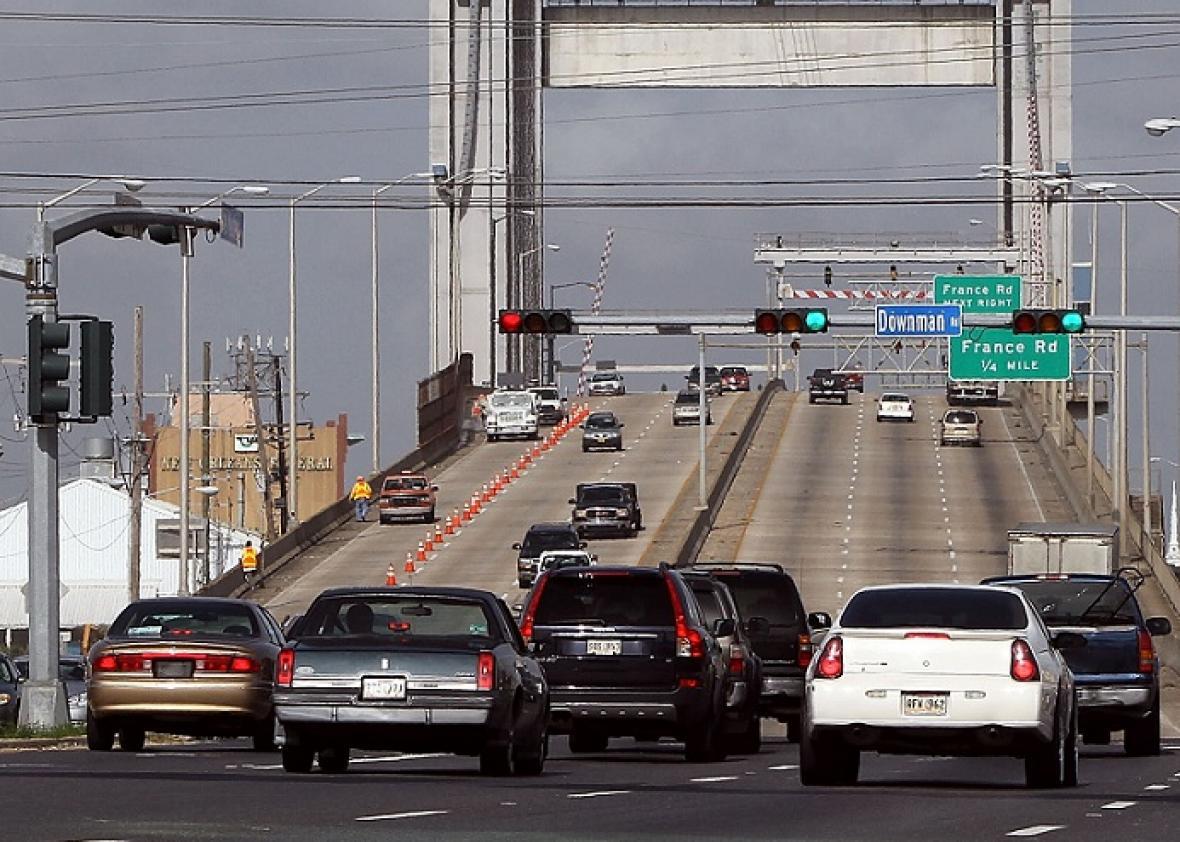A federal appeals court panel ruled Tuesday that five former New Orleans police officers should get a new trial for their alleged roles in the shooting of unarmed citizens on the Danziger Bridge after Hurricane Katrina or in the ensuing cover-up, the New Orleans Times-Picayune reports. The 2–1 decision, which affirms a 2013 order by a U.S. District Court judge, found that anonymous comments posted by federal prosecutors on Times-Picayune online articles might have deprived the officers of an impartial jury in the original trial.
The details of the Danziger Bridge shooting were shocking, even by the standards of post-Katrina New Orleans. A group of pedestrians attempting to cross the bridge was met by several New Orleans police officers driving a rental truck while out of uniform and carrying heavy weapons, including an unauthorized AK-47. The officers, responding to an earlier report of gunfire on the bridge, opened fire on the Bartholomew family and others, killing two and wounding four more, none of whom was armed.
Several members of New Orleans’ police department attempted to fabricate evidence to justify the shooting, including producing reports claiming the victims had guns and traded fire with officers. While state charges filed against the officers were thrown out, four were convicted in federal court of charges relating to civil rights abuses, obstruction of justice, and conspiracy. An additional officer was convicted on lesser charges related to falsified statements and reports.
After the convictions, a new investigation revealed that a prosecutor in the U.S. Attorney’s Office had been engaged in what the officers’ lawyers later described as a “secret public relations campaign” against the officers and other criminal defendants being prosecuted by the Justice Department. That prosecutor, Sal Perricone, eventually resigned. It was discovered, however, that Perricone’s practice of posting anonymous comments trashing defendants on local news stories—some while trials were ongoing—had been adopted by others in the office, including fellow Assistant U.S. Attorney Jan Mann, who’d kept quiet about her own anonymous posts after she’d been assigned to do damage control on the scandal.
The “astonishing” behavior in the U.S. Attorney’s Office persuaded U.S. District Court Judge Kurt Engelhardt in 2013 that the officers deserved a new trial. The outrage over the bridge shooting, Engelhardt wrote, shouldn’t excuse prosecutors’ actions.
The case started as one featuring allegations of brazen abuse of authority, violation of the law, and corruption of the criminal justice system. Unfortunately, though the focus has switched from the accused to the accusors, it has continued to be about those very issues. After much reflection, the court cannot journey as far as it has in this case only to ironically accept grotesque prosecutorial misconduct in the end.
Tuesday’s ruling, issued by a three-judge panel of the 5th U.S. Circuit Court of Appeals, supported Engelhardt’s position. While the grounds for throwing out the convictions might have been “novel and extraordinary,” the majority of the panel wrote, invalidating the first trial was warranted.
U.S. Attorney Kenneth Polite, who took over when Perricone’s boss Jim Letten retired amid criticism of his handling of the comment scandal, did not rule out further appeals Tuesday. That left open the possibility that the Department of Justice will ask the full 5th Circuit to reconsider or attempt to move the dispute to the U.S. Supreme Court. Four of the five officers have remained in custody since 2010.
Ronnie Greene, author of Shots on the Bridge: Police Violence and Cover-Up in the Wake of Katrina, told NPR on Tuesday that the significance of the convictions in the Danziger Bridge case stems in part from the role the community, already struggling to recover from the hurricane, played in bringing the officers to justice.
“[W]ere it not for the residents pushing for the truth, pushing past the police wall of lies, the truth—I don’t think—would have ever come out in this case,” Greene said. “And it was prompted by the residents pushing to get answers, and filing lawsuits that created a whole new narrative on what was being portrayed here. … The department’s fiction would have held, if it weren’t for the residents’ really really pushing.”
